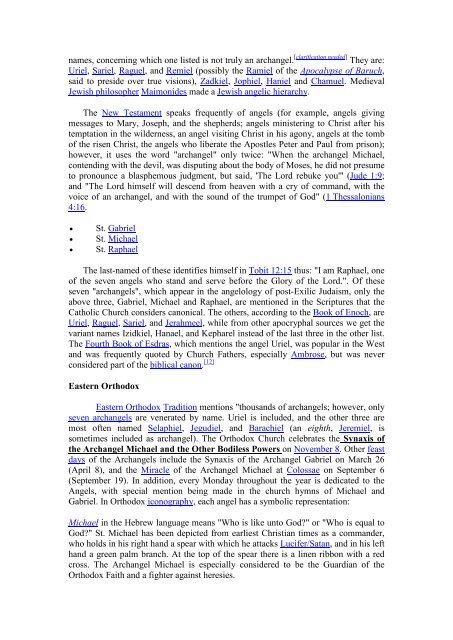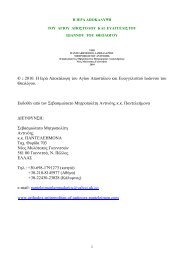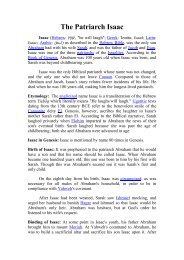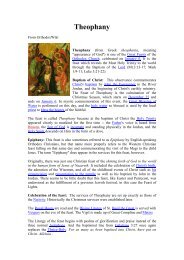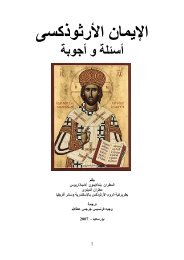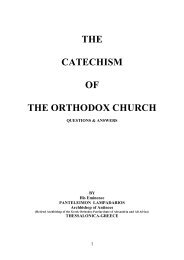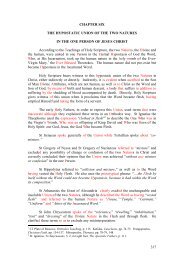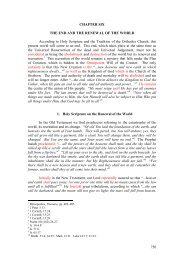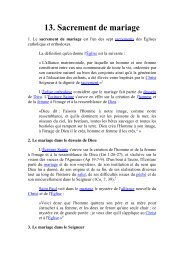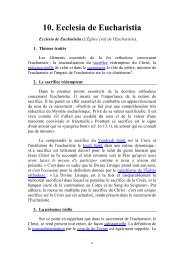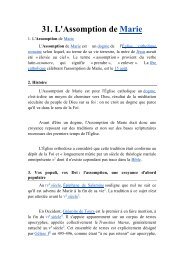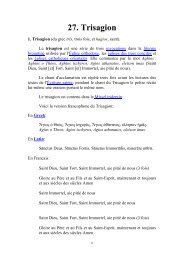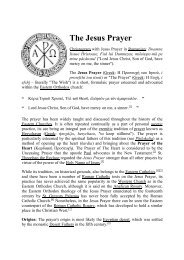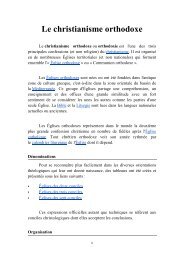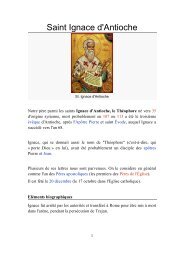The Synaxis of the Archangels Michael - Orthodox-mitropolitan-of ...
The Synaxis of the Archangels Michael - Orthodox-mitropolitan-of ...
The Synaxis of the Archangels Michael - Orthodox-mitropolitan-of ...
You also want an ePaper? Increase the reach of your titles
YUMPU automatically turns print PDFs into web optimized ePapers that Google loves.
names, concerning which one listed is not truly an archangel. [clarification needed] <strong>The</strong>y are:<br />
Uriel, Sariel, Raguel, and Remiel (possibly <strong>the</strong> Ramiel <strong>of</strong> <strong>the</strong> Apocalypse <strong>of</strong> Baruch,<br />
said to preside over true visions), Zadkiel, Jophiel, Haniel and Chamuel. Medieval<br />
Jewish philosopher Maimonides made a Jewish angelic hierarchy.<br />
<strong>The</strong> New Testament speaks frequently <strong>of</strong> angels (for example, angels giving<br />
messages to Mary, Joseph, and <strong>the</strong> shepherds; angels ministering to Christ after his<br />
temptation in <strong>the</strong> wilderness, an angel visiting Christ in his agony, angels at <strong>the</strong> tomb<br />
<strong>of</strong> <strong>the</strong> risen Christ, <strong>the</strong> angels who liberate <strong>the</strong> Apostles Peter and Paul from prison);<br />
however, it uses <strong>the</strong> word "archangel" only twice: "When <strong>the</strong> archangel <strong>Michael</strong>,<br />
contending with <strong>the</strong> devil, was disputing about <strong>the</strong> body <strong>of</strong> Moses, he did not presume<br />
to pronounce a blasphemous judgment, but said, '<strong>The</strong> Lord rebuke you'" (Jude 1:9;<br />
and "<strong>The</strong> Lord himself will descend from heaven with a cry <strong>of</strong> command, with <strong>the</strong><br />
voice <strong>of</strong> an archangel, and with <strong>the</strong> sound <strong>of</strong> <strong>the</strong> trumpet <strong>of</strong> God" (1 <strong>The</strong>ssalonians<br />
4:16.<br />
• St. Gabriel<br />
• St. <strong>Michael</strong><br />
• St. Raphael<br />
<strong>The</strong> last-named <strong>of</strong> <strong>the</strong>se identifies himself in Tobit 12:15 thus: "I am Raphael, one<br />
<strong>of</strong> <strong>the</strong> seven angels who stand and serve before <strong>the</strong> Glory <strong>of</strong> <strong>the</strong> Lord.". Of <strong>the</strong>se<br />
seven "archangels", which appear in <strong>the</strong> angelology <strong>of</strong> post-Exilic Judaism, only <strong>the</strong><br />
above three, Gabriel, <strong>Michael</strong> and Raphael, are mentioned in <strong>the</strong> Scriptures that <strong>the</strong><br />
Catholic Church considers canonical. <strong>The</strong> o<strong>the</strong>rs, according to <strong>the</strong> Book <strong>of</strong> Enoch, are<br />
Uriel, Raguel, Sariel, and Jerahmeel, while from o<strong>the</strong>r apocryphal sources we get <strong>the</strong><br />
variant names Izidkiel, Hanael, and Kepharel instead <strong>of</strong> <strong>the</strong> last three in <strong>the</strong> o<strong>the</strong>r list.<br />
<strong>The</strong> Fourth Book <strong>of</strong> Esdras, which mentions <strong>the</strong> angel Uriel, was popular in <strong>the</strong> West<br />
and was frequently quoted by Church Fa<strong>the</strong>rs, especially Ambrose, but was never<br />
considered part <strong>of</strong> <strong>the</strong> biblical canon. [12]<br />
Eastern <strong>Orthodox</strong><br />
Eastern <strong>Orthodox</strong> Tradition mentions "thousands <strong>of</strong> archangels; however, only<br />
seven archangels are venerated by name. Uriel is included, and <strong>the</strong> o<strong>the</strong>r three are<br />
most <strong>of</strong>ten named Selaphiel, Jegudiel, and Barachiel (an eighth, Jeremiel, is<br />
sometimes included as archangel). <strong>The</strong> <strong>Orthodox</strong> Church celebrates <strong>the</strong> <strong>Synaxis</strong> <strong>of</strong><br />
<strong>the</strong> Archangel <strong>Michael</strong> and <strong>the</strong> O<strong>the</strong>r Bodiless Powers on November 8. O<strong>the</strong>r feast<br />
days <strong>of</strong> <strong>the</strong> <strong>Archangels</strong> include <strong>the</strong> <strong>Synaxis</strong> <strong>of</strong> <strong>the</strong> Archangel Gabriel on March 26<br />
(April 8), and <strong>the</strong> Miracle <strong>of</strong> <strong>the</strong> Archangel <strong>Michael</strong> at Colossae on September 6<br />
(September 19). In addition, every Monday throughout <strong>the</strong> year is dedicated to <strong>the</strong><br />
Angels, with special mention being made in <strong>the</strong> church hymns <strong>of</strong> <strong>Michael</strong> and<br />
Gabriel. In <strong>Orthodox</strong> iconography, each angel has a symbolic representation:<br />
<strong>Michael</strong> in <strong>the</strong> Hebrew language means "Who is like unto God?" or "Who is equal to<br />
God?" St. <strong>Michael</strong> has been depicted from earliest Christian times as a commander,<br />
who holds in his right hand a spear with which he attacks Lucifer/Satan, and in his left<br />
hand a green palm branch. At <strong>the</strong> top <strong>of</strong> <strong>the</strong> spear <strong>the</strong>re is a linen ribbon with a red<br />
cross. <strong>The</strong> Archangel <strong>Michael</strong> is especially considered to be <strong>the</strong> Guardian <strong>of</strong> <strong>the</strong><br />
<strong>Orthodox</strong> Faith and a fighter against heresies.


